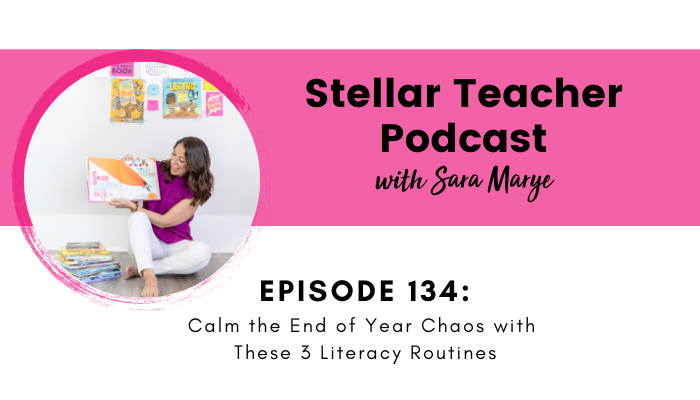
Click play below to hear 3 ways to use end of year routines:
The end of the year is an exciting time for students and there’s a lot planned for celebrating a successful school year. But with all that excitement can come chaos for teachers and students. One way to calm the chaos is by keeping students engaged. So in the last episode of my mini series about student engagement, I’m sharing the benefits of using end of year routines.
As y’all know, I love a good system or process to use with students, which is why I love these 3 literacy routines. The goal of a routine is that the set of tasks that can be completed independently. Therefore, having end of year routines that are already established help you provide structure, keeps students engaged, which helps free up some teacher time for you, and is an opportunity to review key academic content.
With all the uncertainty of the last few weeks of school, end of year routines provide many benefits for your students. So whether these are old routines you’re leaning into or new routines you’re implementing, having set end of year routines helps make the end of year smoother for you and your students.
In this episode on end of year routines, I share:
- The benefits of using end of year literacy routines
- How to gain back time as a teacher use routine stacking to your advantage
- Why using the Poem of the Week routine is a great way to review a variety of standards and skills
- An added benefit for using end of year routines that will help you for next year
- My new favorite paragraph writing routine that’s inside my Confident Writer System Series private podcast
Resources:
- Sign up for my Private Podcast: Confident Writer Systems Series
- Check out the Stellar Literacy Collective Membership
- If you’re enjoying this podcast, please leave a review on Apple Podcasts!
Related episodes and blog posts:
- Episode 133, Keep Your Students Engaged in Reading Until the Very Last Day of School: 7 Tips for You!
- Episode 132, Two Simple Ways to Boost Engagement During Whole Group Lessons
- Episode 78, Literacy Routines for an Engaging End of the Year
- Episode 53, Incorporating Movement Into Your Literacy Block
- Episode 21, How to Keep Students Engaged Until the End of the School Year
Connect with me:
- Join my newsletter
- Shop my TPT store here
- Instagram: @thestellarteachercompany
More About Stellar Teacher Podcast:
Welcome to the Stellar Teacher Podcast! We believe teaching literacy is a skill. It takes a lot of time, practice, and effort to be good at it. This podcast will show you how to level up your literacy instruction and make a massive impact with your students, all while having a little fun!
Your host, Sara Marye, is a literacy specialist passionate about helping elementary teachers around the world pass on their love of reading to their students. She has over a decade of experience working as a classroom teacher and school administrator. Sara has made it her mission to create high quality no-fluff resources and lesson ideas that are both meaningful and engaging for young readers.
Each week, Sara and her guests will share their knowledge, tips, and tricks so that you can feel confident in your ability to transform your students into life-long readers.
Tune in on your favorite podcast platform: Apple, Google, Amazon, Spotify, Stitcher, and more! If you’re loving this podcast, please rate, review, and follow!
Podcast (stellar-teacher-podcast): Play in new window | Download
Hey, there, and welcome back to another episode, I have a question for you. So on a scale of one to 10, how chaotic is the end of the year going for you? I know many of you are literally like maybe two weeks away, maybe three, four. And I know that this time of year like the chaos just seems to ramp up.
So whether you’re starting to feel that stress and overwhelm, because your student behavior is starting to be maybe a little disruptive or unpleasant, which often happens after state testing is over. Or maybe the chaos you’re feeling is internal because your teacher to do list is growing by the day with all of your end of your tasks, you’ve got to finalize your gradebook, you’ve got to take down your bulletin boards, you got to pack up your library, you got to send those summer school notices home, or maybe it’s both.
So regardless, if you are starting to feel a bit of the end of year overwhelm, I did want to offer you a suggestion that I think can really calm the end of year chaos and can help keep your students engaged up until the end of the year. These are things that I used when I was in the classroom and it really helped just make the end of the year so much smoother.
Now if you’ve been listening to the podcast for the past three weeks, then you know that we are wrapping up a short little series all about student engagement. In Episode 131, I shared two simple strategies to boost engagement during your whole group lesson, any whole group lesson for that matter.
And in Episode 132, I shared seven ideas that are really fun and exciting and will keep students engaged in reading up until the very last day of school. And today I’m going to share with you three ways that literacy routines can help with engagement at the end of the year and routines can seriously be your lifesaver during a really crazy time.
Now, if you’ve been listening to the podcast for a while, then you guys know that I love a good routine or system or process or anything with a repeatable set of steps. So just to make sure we’re on the same page when I use the phrase literacy routine. It simply refers to anything with a repeatable set of steps.
So you probably have several literacy routines going on in your classroom right now, even if you haven’t called them a literacy routine. And even if you don’t know that that’s what they are.
So the way you structure and set up your literacy centers might be routine, if it’s the same sort of system and process that students engage in day after day. Your independent reading time might be a routine, you might have a buddy reading routine in your classroom. Now even if your morning work isn’t literacy, only, you probably have a morning work routine or even just a morning routine.
A routine is simply anything that your students can complete without asking you. How do I do this? Which is ultimately what we want, right? We want that independence, we want students to know what is expected of them without having to repeat ourselves day after day.
I have mentioned several routines that we’ve either created or routines that I used when I was in the classroom. And these are all routines that are part of our membership site, the Stellar Literacy Collective. So if you’re a member, then you’ve probably used several of these routines. But we love talking about poem of the week, word of the day or word of the week, our sentence writing routine, our picture of the day routine.
All of these routines, these structured routines that we’ve come up with, they have the same set of steps that students take to complete the task. So students, you know, when you tell them we’re going to do poem of the week, you don’t have to explain what it is that they’re doing. They know because it’s the same thing that they do every single week.
Now, if you are not familiar with any of these routines, reach out to me on Instagram @thestellarteachercompany and I can point you in the direction of either a freebie or a podcast episode that talks specifically about those routines that I just mentioned, because we have freebies and podcast episodes for all of them.
But today I specifically wanted to talk about the benefits to using end of year routines and hopefully encourage you to start really relying on your routines to help you really wrap up your end of year teacher to do list.
So the first reason why routines are so powerful at the end of the year is that they provide structure to what often becomes a really loose and lacks daily schedule. And I’m sure you’re starting to experience this. But it seems that once state testing is over, and this is not even an upper elementary, I even experienced this when I was like a second and first grade teacher.
But once testing is over, the school schedule just tends to become so much more relaxed, you know, there’s less pressure, it’s like this deep breath that we can all take. But there’s also these end of year disruptors that just started, you know, they pop up every few days, there’s a field day, there’s fifth grade graduation, there’s end of year concerts, there’s field trips, there’s, you know, movie day celebration, all of these things that start to pop up and disrupt our schedule.
And we know that students thrive on routine and schedules. We know that teachers thrive on routines and schedules. So if you’re starting to realize that your daily schedule is already somewhat hectic and chaotic, then you want to make sure that you’re still incorporating routines and systems that your students are familiar with.
So even if your students are having field day, they can still do word of the day or word of the week, they can still do their buddy reading routine, they can still do independent reading, they can still do their sentence writing routine, whatever it is.
So keeping these literacy routines are going to help your students be reminded that they are still in an academic setting, and the academic behavior that is expected of them is still necessary. So routines are helpful for you and your students just to remember to stay in school mode up until the last day of the year. So that is one benefit of routines.
Maybe the biggest benefit, though is that routines are going to keep your students engaged, and they possibly can free up teacher time to deal with end of year tasks.
So remember how I said that a routine is really anything where students can complete it without having to ask you, how do I do this? Well, you can really use that to your advantage. So take a minute and think about the routines that your students know how to do. Like I said, maybe that’s independent reading, maybe that is a word of the week routine. Maybe you have some other routine that you’ve incorporated in there.
When you’re scheduling these routines into your instructional day, I also want you to start scheduling in the end of your task that you plan on completing during that time. So if your students do word of the week, and it takes them 15 minutes, then you’re going to plan on entering grades during those 15 minutes. If your students do buddy reading for 20 minutes, then you’re going to schedule time to take down your backup bulletin board during that time.
So start to be strategic, because you have a lot of stuff to do at the end of the year. And you should be able to use your time during the school day to get those things done. So if your students are engaged in routines, then you can use that time to start to tackle your end of your to do list.
Now here’s the really cool thing. If you and your students have been using a lot of routines this year, then you can do what I like to call routine stacking. And this is where you’re going to have your students complete three to four routines back to back to back.
So maybe they’re going to do word of the day. And then immediately, they’re going to do a poem of the week. And then they might follow that up with sentence writing routine. And then maybe they’re going to end with independent reading.
And routine stalking is great, because your students are switching tasks every 10 to 15 minutes. So it’s not like you’re asking them to do the same thing for 45 minutes or an hour. So they’re going to stay engaged because they’re constantly doing something new. But because they’re independent with all of these routines, and you’re going to stack them one on top of the other, you are going to get like 45 minutes or an hour of time that you can dedicate to chipping away at your end of year teacher to do list.
So if you’ve been doing a bunch of routines this year, start stacking them together and give yourself some extra time, which will hopefully eliminate some of your teacher stress.
Now, if you’re going to do routine stacking, I would suggest making a slide or an anchor chart that explains what routines you expect your students to complete, in what order and include any other expectations you have, whether it’s around movement or noise level and what they should do when they’re finished.
Because remember, the goal is for them to be engaged in something that is academic and productive, but also to be independent. So that way you can work on some of your teacher to do list items.
So the third benefit of using routines at the end of the year, is that it gives you a chance to spiral through and review some key academic content, even though you’ve probably made it through teaching all of your standards at this point, and hopefully you’re finished with end of your testing. My guess is that you still have some students who haven’t mastered 100% of their grade level content.
And we don’t want to forget about those students and we really want to use you know, whether it’s two weeks, three weeks or four weeks, you really do want to use this time as best you can to help your students to be prepared for next year. And routines can be a great way to provide remediation, and support on standards and skills that your students just didn’t quite get during the school year.
So a great example of this is using poem of the week. And this is a great routine because it spirals through a variety of standards and skills. So if you haven’t had a chance to try this with your students, yet, this year, you can even start to introduce it now, and do this routine for the last three or four weeks of the year.
So with this routine, students are going to read a poem every single week. And there’s really two aspects of it that can really benefit students. First, every day, they’re going to read the poem, and they’re going to do some sort of fluency task. So maybe it is looking for the words that they don’t know and then making sure that they know how to accurately pronounce them.
Maybe they’re working on their expression. Maybe they’re working on their speed, maybe they’re working on their pacing, so all of the different aspects of fluency. But in addition to that, they’re also going to be working on other tasks that are going to address vocabulary or comprehension, or maybe even phonics.
So one day, they might have to identify the rhyme scheme. One day, they might have to identify a specific word and explain why that word choice was so important to the poem. One day, they might have to make an inference about the speaker in the poem. One day, they might have to explain the theme of the poem.
And another day, they might have to summarize. And another day, they might have to compare and contrast the poem with another text. Now, I know that many upper elementary students struggle with things like inferencing, and summarizing and identifying theme.
So even if you’ve already taught those concepts, and even if your students have already been tested on them, you might as well give your students some fun and engaging practice with those skills while you still can, because that’s just going to help them feel more confident and prepared for next year.
So literacy routines are a great way for students to stay productive and engaged on academic work up until the last day, especially if you feel like you were rushed through some of the standards or skills that you didn’t quite get to spend as much time on throughout the year as you were hoping to.
Now as an added benefit, literacy routines are also a great chance for you to practice or refine or introduce a new routine that you might want to use next year. So if you’ve been listening to this episode, and you’re like, oh, man, I really understand why routines can be so helpful at the end of the year, I wish I had more routines in place.
Well, now’s a great time to test them out. I always loved using the end of the year to test out different practices and ideas and strategies to see if they would actually work with my style of teaching for next year. So if you’ve never done poem of the week, try it out. If you’ve never tried doing word of the day, try it out. If you’re looking for a good sentence writing routine, try that out.
And the examples that I’ve given on this episode are just a handful of examples, there’s literally is an unlimited number of routines that you can create for your classroom.
Now, I will say if you are looking for a new paragraph writing routine that is quick and easy for both teachers and students, I am sharing the details of my new favorite literacy routine inside the Confident Writer System Series, which is a private podcast that I recorded for you the listeners in my audience.
And if you want to learn more about how to effectively teach writing in upper elementary, and if you want to get a sample of our new paragraph writing routine, which is something that you could totally test out with your students at the end of the year, then go to stellarteacher.com/writingpodcast to sign up.
It’s completely free to you. It is a five episode series that is pretty short, you can listen to the whole thing in less than 90 minutes. And like I said, it includes a free sample of our brand new paragraph writing routine. I will leave the link to that in the show notes. But you can find the sign up page at stellarteacher.com/writingpodcast. That’s all one word writing podcast.
Okay, so in review, if you’ve got some chaos going on at the end of the year right now, or if you’re feeling like your teacher to do list is a little stressful, then start putting some literacy routines in place or start leaning on the routines that you already have in place.
Because as we learned from this episode, literacy routines are going to help you provide structure to what often becomes a loose and lacks daily schedule. They also keep your students engaged and can free up teacher time to deal with end of your tasks. And literacy routines are a great opportunity for you to review and spiral through some key academic content.
So know that I am wishing you a stellar end of the year. You’ve totally got this and I’ll see you back here Next Monday.

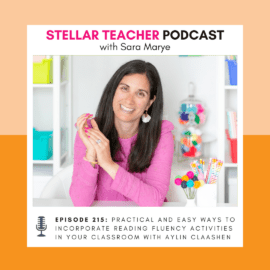
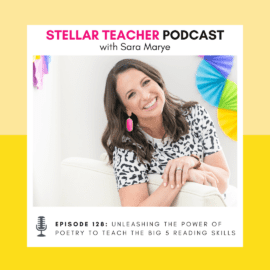
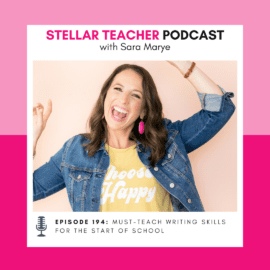
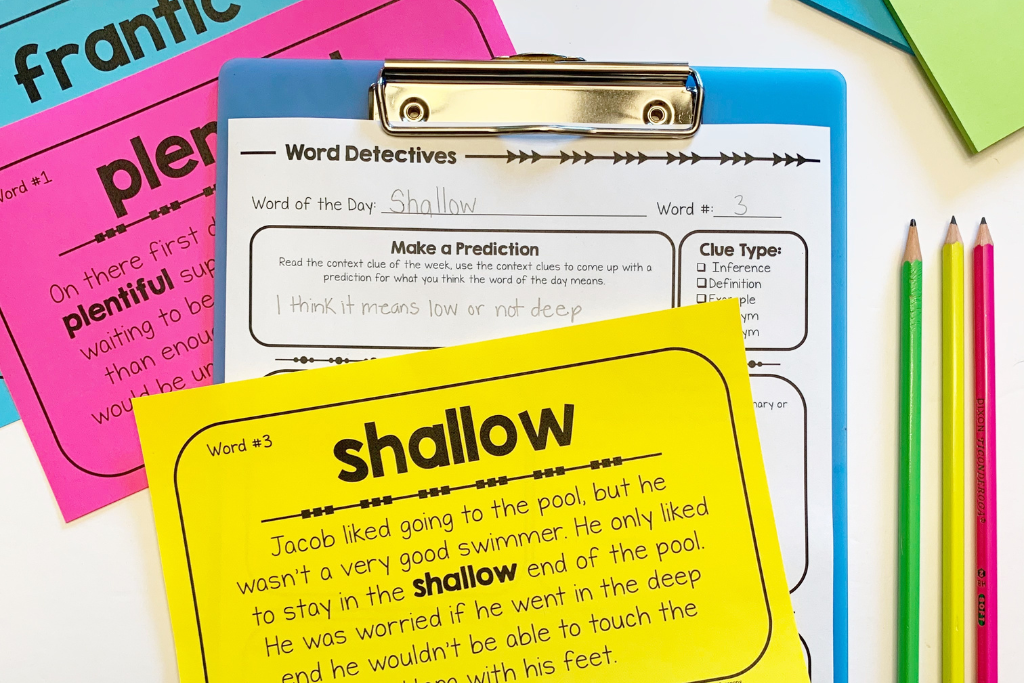
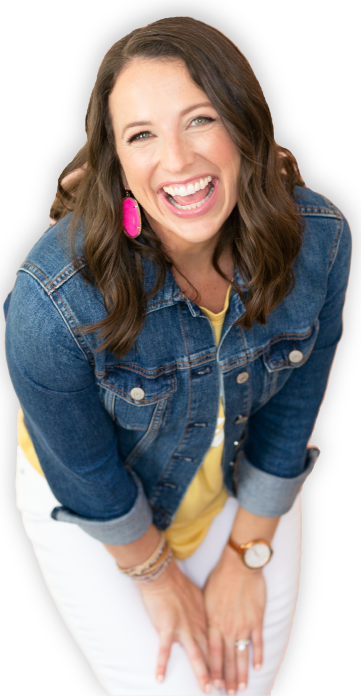
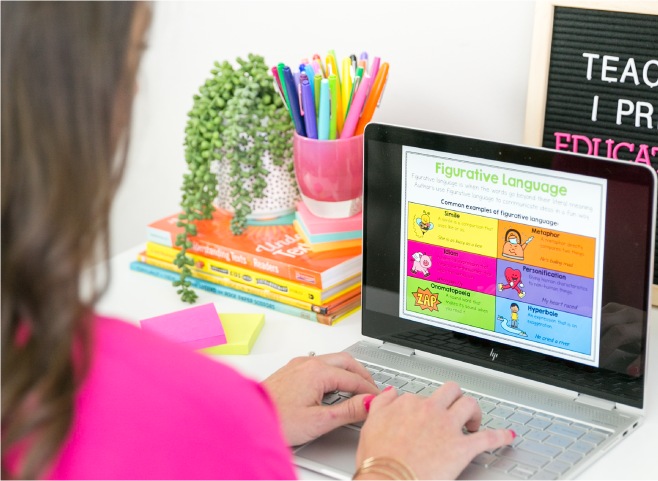
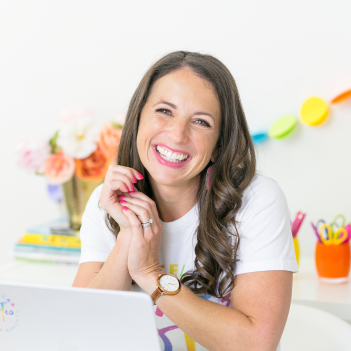
Leave a Comment
You must be logged in to post a comment.